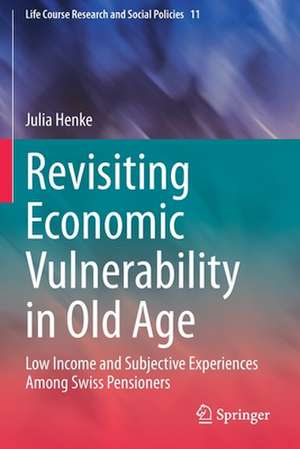Revisiting Economic Vulnerability in Old Age: Low Income and Subjective Experiences Among Swiss Pensioners: Life Course Research and Social Policies, cartea 11
Autor Julia Henkeen Limba Engleză Paperback – 5 mar 2021
| Toate formatele și edițiile | Preț | Express |
|---|---|---|
| Paperback (1) | 642.36 lei 6-8 săpt. | |
| Springer International Publishing – 5 mar 2021 | 642.36 lei 6-8 săpt. | |
| Hardback (1) | 648.74 lei 6-8 săpt. | |
| Springer International Publishing – 5 mar 2020 | 648.74 lei 6-8 săpt. |
Preț: 642.36 lei
Preț vechi: 755.72 lei
-15% Nou
Puncte Express: 964
Preț estimativ în valută:
122.92€ • 131.44$ • 102.48£
122.92€ • 131.44$ • 102.48£
Carte tipărită la comandă
Livrare economică 18 aprilie-02 mai
Preluare comenzi: 021 569.72.76
Specificații
ISBN-13: 9783030363253
ISBN-10: 3030363252
Ilustrații: X, 326 p. 61 illus.
Dimensiuni: 155 x 235 mm
Greutate: 0.47 kg
Ediția:1st ed. 2020
Editura: Springer International Publishing
Colecția Springer
Seria Life Course Research and Social Policies
Locul publicării:Cham, Switzerland
ISBN-10: 3030363252
Ilustrații: X, 326 p. 61 illus.
Dimensiuni: 155 x 235 mm
Greutate: 0.47 kg
Ediția:1st ed. 2020
Editura: Springer International Publishing
Colecția Springer
Seria Life Course Research and Social Policies
Locul publicării:Cham, Switzerland
Cuprins
1. Theoretical Framework.- 2. Research Design.- 3. Prevalence of Economic Vulnerability among Swiss Pensioners.- 4. The Self-Assessed Measure of Economic Vulnerability.- 5. The Perceived Measure of Economic Vulnerability.- 6. Discussion and Conclusion.
Notă biografică
Julia Henke obtained her PhD in socioeconomics at the University of Geneva, Switzerland, in collaboration with the Swiss National Centre of Competence in Research LIVES. Her research interests focus on quality of life, specifically the intersection of economic and psychological well-being. During her doctoral studies she started working for a development organization and since 2016 she works as a researcher in the communications department of a humanitarian organization.
Textul de pe ultima copertă
This book offers an interdisciplinary analysis of the experience of economic vulnerability among older adults. Drawing on various fields ranging from happiness, economics to stress research, it integrates assessments from objective and subjective measurement perspectives. The book offers nuanced insights into prevalent experiences of low economic quality of life in wealthy countries, using empirical data from Switzerland. A sample of some 1500 adults aged 65-84 is taken as the basis for a systematic comparison of the demographic and socioeconomic characteristics of three – overlapping – groups of potentially vulnerable pensioners: those who are income-poor (objective measure), those who report difficulties making ends meet (subjectively self-assessed measure) and those who worry about not having enough money for current expenses (subjectively perceived measure). Theoretical and empirical evidence is offered for the distinctiveness of the two subjective indicators, one of whichassesses the experience of economic strain while the other captures the individual’s response in terms of stress. The conceptual contribution of this research includes a typology of economic vulnerability: eight distinct profiles emerge at the intersection of the objective, self-assessed and perceived measures. These profiles correspond to specific risk constellations, and they reflect varying degrees of human agency in dealing with economic vulnerability.
Caracteristici
Provides a framework for distinguishing between different degrees of subjectivity in poverty measures The statistical methods used include regression analysis and structural equation models Draws on a wide range of theoretical strands from economics to psychology empirical, conceptual and theoretical contributions Uses empirical data from Switzerland
















